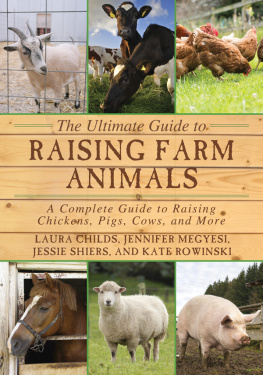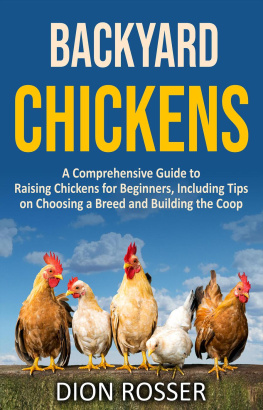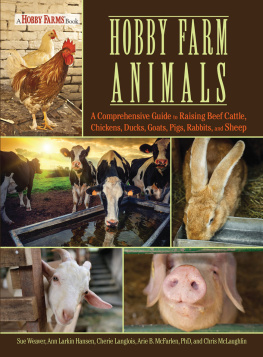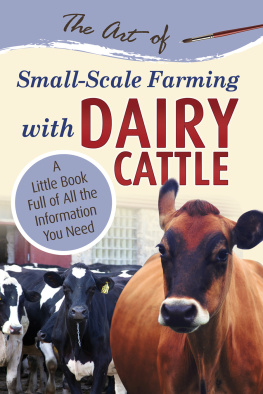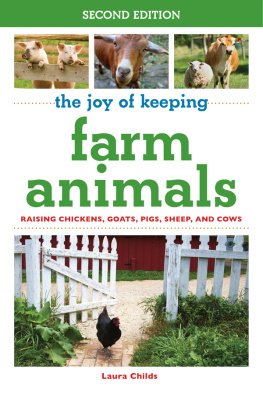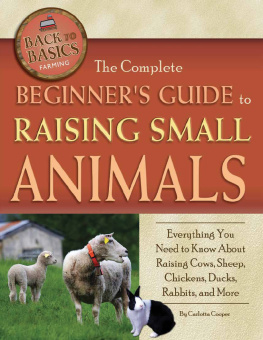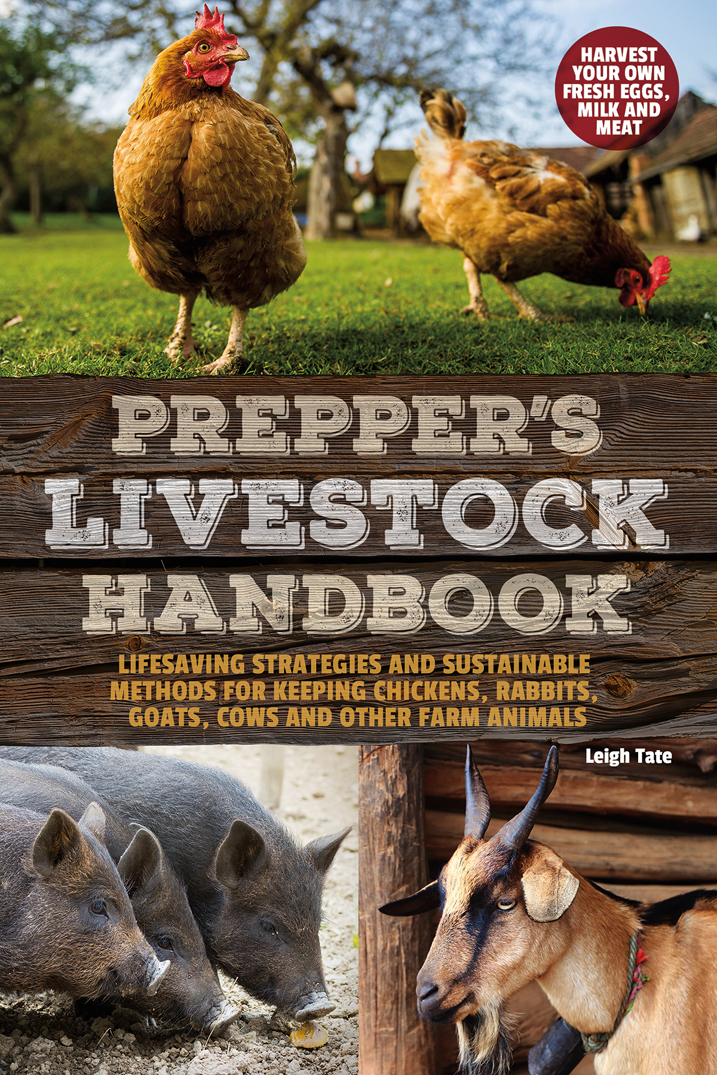
Text copyright 2018 Leigh Tate. Design and concept copyright 2018 Ulysses Press and its licensors. All rights reserved. Any unauthorized duplication in whole or in part or dissemination of this edition by any means (including but not limited to photocopying, electronic devices, digital versions, and the internet) will be prosecuted to the fullest extent of the law.
Published in the United States by:
Ulysses Press
P.O. Box 3440
Berkeley, CA 94703
www.ulyssespress.com
ISBN: 978-1-61243-818-4
Acquisitions editor: Casie Vogel
Managing editor: Claire Chun
Project editor: Shayna Keyles
Editor: Renee Rutledge
Proofreader: Bill Cassel
Indexer: Sayre Van Young
Front cover and interior design: what!design @ whatweb.com
Cover artwork from shutterstock.com: wooden boards Madredus, chickens napocska, pigs pavla, goat suphanat
Interior artwork: see
Distributed by Publishers Group West
IMPORTANT NOTE TO READERS: This book is independently authored and published and no sponsorship or endorsement of this book by, and no affiliation with, any trademarked brands or other products mentioned within is claimed or suggested. All trademarks that appear in this book belong to their respective owners and are used here for informational purposes only. The author and publisher encourage readers to patronize the quality brands mentioned and pictured in this book.
To those who are willing to stay the course.
Know well the condition of your flocks,
and pay attention to your herds;
for riches are not forever,
nor does a crown endure to all generations.
Proverbs 27:23-24
CONTENTS
Table of Contents
Guide
At midnight on January 1, 2000, my family gathered around the telephone and held their breath. It was Y2K. We had heeded the advice to prepare for a possible failure of the worlds computer systems. Wed stocked up on canned and dried goods, water, kerosene lamps, kerosene, firewood, and a laundry plunger for washing clothes. At 12:01 a.m., my husband picked up the receiver and listened. We had a dial tone! The lights didnt go out, and life went on as usual.
Even though Y2K is a distant memory now, preparedness remains a trendy topic. Whether motivated by environmental, economic, political, or personal uncertainties, more and more people are taking steps to be prepared. Preparedness can take different forms. For some people, it might mean working from a checklist to stock up on enough food and supplies to last three months, six months, or even a year. Others, like Dan and I, choose a different approachhomesteading.
I think its safe to say that homesteading means different things to different people. For some, it might be as simple as having a garden and keeping a few backyard chickens. For others, it may mean a full-scale off-grid lifestyle. Or it may mean something in between. The common ground is that homesteaders desire a simpler, more sustainable, more self-reliant way of living. They desire to be more hands-on in meeting their needs and the needs or their families. Homesteading describes the lifestyle that enables them to work toward this goal.
If you absolutely love your job and your life, then likely, homesteading wont interest you. But there are reasons you might consider homesteading:
You feel your life is too fast-paced and hectic.
You dont like the pressure to have more, do more, and be more.
You feel dissatisfied with consumerism and its ever-rising costs.
You want to know exactly where your food comes from and whats in it.
You have a sense of being disconnected from nature.
You want your lifestyle to be more environmentally friendly.
You feel that the world is heading in the wrong direction and you are uncertain about what the future holds.
Homesteading is the answer to all of these concerns and more. Its a choice that enables you to take steps toward greater independence and have a sense of purpose while taking them.
From a preparedness perspective, Dan and I believe that working toward self-reliance is our best strategy. While I admit we have little confidence in the current economic system and the lifestyle required to maintain it, I can also tell you that our self-reliance has been lifesaving on more fundamental levels. Many of you understand what its like to be jobless for months, or to have an extended loss of power. Or perhaps you are looking at a limited-income retirement. For these reasons, we have found self-reliance to be prudent as well as practical.
This book is for those who are looking for long-term preparedness that goes beyond simply stocking up on canned foods, dry goods, and other necessities. Gardening adds fresh vegetables and fruits to the diet, but keeping farm animals will enable you to have fresh eggs, milk, butter, cheese, and meat.
Those of us who didnt grow up farming are often puzzled about how to begin. We lack the skills and knowledge needed to make a start. Dan and I had to rely on research plus trial and error, but always with the question what if? on our minds. What if we could no longer buy layer pellets at the feed store? What if we could no longer buy filters for straining milk, or cultures and rennet for making cheese? What if the grid goes downhow will we store our eggs, milk, and meat? Some of what we tried worked, but some of it didnt. This book is a compilation of everything we have learned about preparedness with livestock and how we put it into practice. Its aim is to give you the advantage of our research and experience, so that hopefully you can avoid some of the problems we have had.
A truly comprehensive book on livestock preparedness would be nearly impossible to write. It would have to cover all farm animals in all locations, including variables in climate, seasons, weather, soil, and terrain. The truth of the matter is that what works well for one person in one part of the world may or may not work for someone in a different location.
Preppers Livestock Handbook will give you the information you need to make workable choices for your own homestead. My goal is to give you a foundation upon which to build that you can adjust according to your personal goals and circumstances. In the Resources section, you will find lists to help you research your specific choices and needs. I recommend that you get a three-ring binder for organizing your personalized notes. Computers and digital devices are convenient, but hard-copy information will be there when electronics fail.
People keep livestock for many reasons: eggs, dairy, meat, vegetation control, manure for compost, to sell, as pets, for showing, for breed conservation, because they like a particular animal, or any combination of these. Your reasons for keeping farm animals will determine your livestock philosophy and methods, as will your location and terrain.
Regional factors to consider include seasonal temperatures and length of daylight. Egg laying, for example, is influenced by the amount of daylight. Areas with mild winters will allow for year-round grazing, while colder areas with more snow will limit pasture and forage. Climates with harsh winters will require sturdier housing and wind breaks. In climates with sweltering summer heat, you will need to provide shade and plenty of fresh water. Breed choices may be affected by these conditions too. Long-haired Highland cattle will thrive in cold climates, while the Florida Cracker is well adapted to hot climates. Nubian and Savanna breed goats are more heat than cold tolerant, while Saanens and Oberhaslis adapt better to cold. Most animals will do well on any terrain, although rocks and steep hills will make fencing and barn building more challenging!


